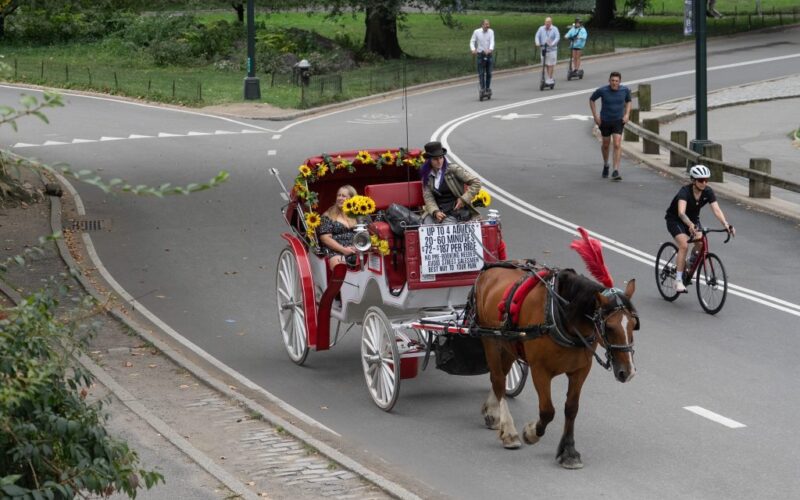The transit union representing Central Park carriage-horse owners and drivers is suing the non-profit leading the charge to ban the industry, claiming a “pattern of malice” against its members.
The Transport Workers Union, which represents the roughly 200 owners and drivers who operate horse-drawn carriages in Central Park, filed suit against New Yorkers for Clean Livable and Safe Streets — NYCLASS — in New York Supreme Court Monday, alleging the group knowingly spreads false claims in an effort to build support for a ban carriage horses.
“NYCLASS has used unlawful means, including, but not limited to, misrepresentation to the public and third parties, and/or acted with the purpose of harming the carriage drivers and their business, under the pretense of animal rights,” the complaint reads.
The union accuses the non-profit of tortious interference for allegedly attempting to undercut the carriage-horse industry.
The suit is the first legal action to be filed since the Daily News reported that the TWU was gearing up to sue Adams administration officials as well as NYCLASS staff over the ongoing carriage horse debate. Ending the tradition has gained significant political support over the last year, including from the Central Park Conservancy and Mayor Adams.
In its complaint, the TWU identifies two instances in which the union alleges NYCLASS claimed dead carriage horses had been abused despite autopsy reports finding they died of natural causes.
The suit references the death of a 15-year-old carriage horse named Lady, who collapsed and died on the street in August while returning to her stable in Hell’s Kitchen.
NYCLASS responded to the equine death with rallies outside City Hall, calling on the City Council to pass Ryder’s Law, which would effectively wind down the carriage horse industry in New York City. At the rallies and in media interviews, NYCLASS spokespeople said Lady had been worked to death — part of what NYCLASS spokeswoman Edita Birnkrant called a “pattern of cruelty.”
TWU officials at the time said Lady died of “natural causes,” suffering an aortic rupture due to underlying health conditions. A necropsy report prepared by Cornell Univeristy’s Animal Health Diagnostic Center and attached as an exhibit to the lawsuit states that Lady died from an aortic rupture likely related to hypertension caused by a small tumor on the horse’s adrenal gland.
“Despite published confirmation from medical experts that Lady’s death was the result of natural causes, NYCLASS continues to use Lady’s death to repeat its misrepresentations and to unlafully interfere with the horse carriage drivers,” TWU’s suit reads.
The union goes on to argue that NYCLASS “did the same thing” in 2020, when a horse named Aysha collapsed on the street and was later euthanized. Health Department records indicate the horse was “in good health prior to her death,” the suit claims, but “[d]espite all of the well-documented information released regarding Aysha, NYCLASS spread and continues to maliciously misrepresent Aysha’s tragic death for its unlawful interference with horse carriage drivers.”
Similarly, the suit claims, NYCLASS has on two occasions claimed to have bought retired carriage horses from so-called “slaughter auctions,” when — according to TWU — one of those horses was auctioned off as a “riding horse” and the other was given directly to a stable in Lancaster County, Penn.
“NYCLASS has continuously and maliciously intentionally used falsehoods and misrepresentations to injure and destroy the horse carriage industry and the carriage workers represented by TWU,” the suit reads.
Birnkrant, the NYCLASS spokeswoman, told the Daily News that the non-profit had not yet been served with the suit, which was filed midday Monday.
“This appears to be a desperate attempt by a failing business brought low by its own actions,” Birnkrant said in a statement. “For years, New Yorkers have witnessed horses collapsing and even dying on our streets, spooking and running wild in traffic and in Central Park, crashing into cars and injuring people.”
“From London and Paris to Brussels and Salt Lake City, from Chicago and Toronto to San Antonio, Montreal, Mumbai, Barcelona, and Beijing — cities around the world have already phased out or shut down horse-drawn carriages, and more are continuing to do so every year to protect public safety and animal welfare,” she added.
TWU is seeking damages in excess of $1 million.








